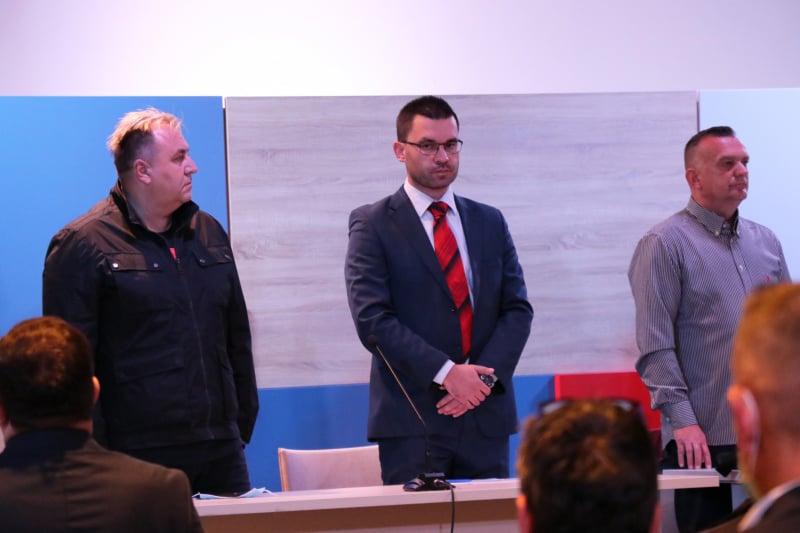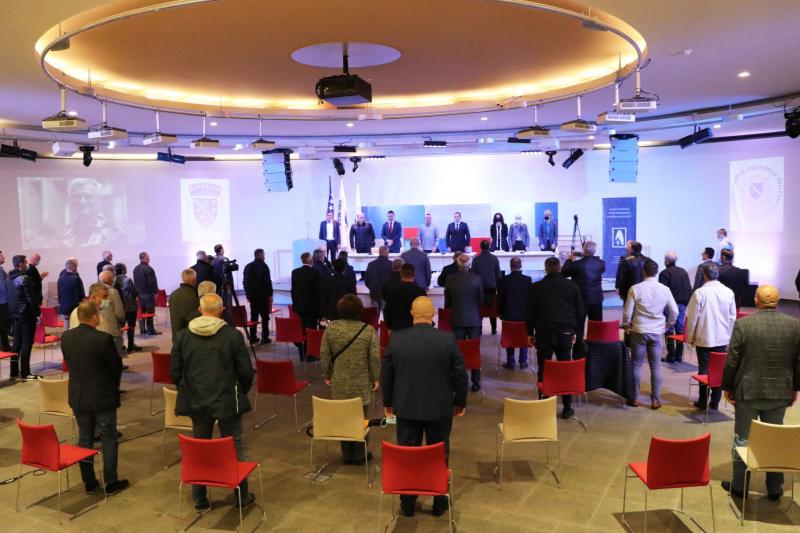In the organization of the Coordination Committee of Veterans' Associations of Sarajevo Canton, a round table entitled "War crimes and their prosecution" was held yesterday in the multimedia hall of the Kovači Memorial Center.
Representatives of the Ministry of Internal Affairs of the Federation of Bosnia and Herzegovina, the Institute for Research of Crimes against Humanity and International Law, the Ministry of Security of Bosnia and Herzegovina and lawyers specialized in international law and crimes against humanity participated in his work.
Speaking about war crimes and their prosecution, the Minister for Veteran Affairs of the Sarajevo Canton, Omer Osmanović, noted that in Bosnia and Herzegovina there are systematic attacks on former members of the RBiH Army, with a kind of torture that has been particularly pronounced in the last few years, and that the round table organized precisely for the reason of finding an appropriate approach to solving such attacks on members of our honorable RBiH Army.
"The Ministry of Veterans' Affairs of the Canton of Sarajevo, through its budget funds, continuously helps the legal protection of people who defended our homeland, and today they are charged with serious crimes. The coordination of veterans' associations aims at systemic action in this field, and we are just witnessing the last attempt to equalize criminals and aggressors by arresting our Edin Vranje. As the line minister, I am in constant contact with Edin and his family, and yesterday we approved material aid that should help in his defense," said Minister Osmanović.
Considering the constant attacks of the aggressors, which have not ended even today, when we have formal and legal peace, Minister Osmanović pointed out that it is very important that such meetings are organized with the aim of joint action of all institutions at the level of Bosnia and Herzegovina, and to prevent collapse integrity of the RBiH Army.
"There is no way, and no attack, that will equate those who defended themselves, with those who are trying even today, with aggressive rhetoric, to minimize the genocide committed against the Bosniaks of Bosnia and Herzegovina," said Osmanović.
Ismet Godinjak, on behalf of the Coordination of Veterans' Associations, spoke about the documents SANU 1, SANU 2 and SANU 3, pointing out, among other things, that officials from the Republic of Serbia behave according to the guidelines from the aforementioned documents, while lawyer Edina Rešidović spoke about practical advice how to behave in situations when an arrest occurs at the border crossings of neighboring countries, as well as the implementation of the protocol on the jurisdiction of prosecutors' offices and courts, both in BiH and Serbia. The latest such case is the arrest of former high-ranking official of the Federal Police Administration Edin Vranje.
"In this case, an arrest was made on the same basis. The protocol states that the procedure can be repeated, only if there is new material evidence. In this case, no new material evidence was offered, and the Prosecutor's Office of Serbia initiated the arrest procedure and re-initiated the procedure against Edina Vranje, regardless of the fact that the Prosecutor's Office of Bosnia and Herzegovina, based on the same evidence and principles, issued an order not to conduct an investigation," Rešidović said.
Muamer Džananović, research associate of the Institute for the Research of Crimes Against Humanity and International Law of the University of Sarajevo, said that it is very important to sublimate everything that is currently happening, namely that Serbia has assumed a leading role in the prosecution of war crimes on the territory of the Republic of Bosnia. and Herzegovina in the period 1992-1995.
"It is absurd to arrest members of the RBiH Army, and at the same time, openly, from the highest political top of Serbia, it is being said that Serbia is a safe haven for those against whom indictments have been brought. Cases like Duško Kornjača, who is accused of war crimes in Čajnič, or Bran Petković, the commander of the Territorial Defense of the so-called Serbian Municipality of Goražda, where the barbaric crimes were committed, support the justification of such gatherings," said Džananović.
Speaking about the political significance of prosecuting war crimes, BiH Security Minister Selmo Cikotić emphasized that it is necessary to draw a line below which one must not go, and that on this issue all pro-Bosnian political options must be on the same side.
"It is necessary to act strategically and proactively, not reactively to certain events from Belgrade and Zagreb," said Cikotić.
.jpg)

Source: Vlada KS
